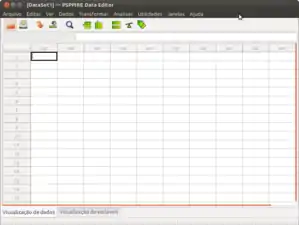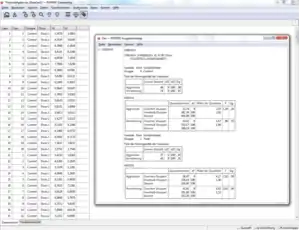PSPP
PSPP is a free software application for analysis of sampled data, intended as a free alternative for IBM SPSS Statistics. It has a graphical user interface[2] and conventional command-line interface. It is written in C and uses GNU Scientific Library for its mathematical routines. The name has "no official acronymic expansion".[3]
 | |
| Developer(s) | GNU Project |
|---|---|
| Stable release | 1.4.1[1]
/ 5 September 2020 |
| Repository | |
| Written in | C |
| Operating system | GNU, macOS, Microsoft Windows, Linux |
| Type | Statistics |
| License | GNU General Public License |
| Website | www |
Features
This software provides a comprehensive set of capabilities including frequencies, cross-tabs comparison of means (t-tests and one-way ANOVA), linear regression, logistic regression, reliability (Cronbach's alpha, not failure or Weibull), and re-ordering data, non-parametric tests, factor analysis, cluster analysis, principal components analysis, chi-square analysis and more.
At the user's choice, statistical output and graphics are available in ASCII, PDF, PostScript, SVG or HTML formats. A range of statistical graphs can be produced, such as histograms, pie-charts, scree plots, and np-charts.
PSPP can import Gnumeric and OpenDocument spreadsheets, Postgres databases, comma-separated values and ASCII files. It can export files in the SPSS 'portable' and 'system' file formats and to ASCII files. Some of the libraries used by PSPP can be accessed programmatically; PSPP-Perl provides an interface to the libraries used by PSPP.
Origins
The PSPP project (originally called "Fiasco") was born at the end of the 1990s as a free software replacement for SPSS, which is a data management and analysis tool, at the time produced by SPSS Inc. The nature of SPSS's proprietary licensing and the presence of digital restrictions management motivated the author to write an alternative which later became functionally identical, but with permission for everyone to copy, modify and share.


Third Party Reviews
In the book "SPSS For Dummies", the author discusses PSPP under the heading of "Ten Useful Things You Can Find on the Internet".[4]
See also
| Wikimedia Commons has media related to PSPP. |
References
- "pspp-1.4.1 released"; author name string: Ben Pfaff; publication date: 5 September 2020; retrieved: 7 September 2020.
- "PSPP Overview". freestatisticalsoftware.com. 2013. Retrieved 24 September 2013.
- "GNU PSPP — Frequently Asked Questions". gnu.org. GNU. Retrieved 2020-09-26.
- McCormick, Keith; Salcedo, Jesus; Poh, Aaron. SPSS Statistics for Dummies (PDF). ISBN 1118989015.